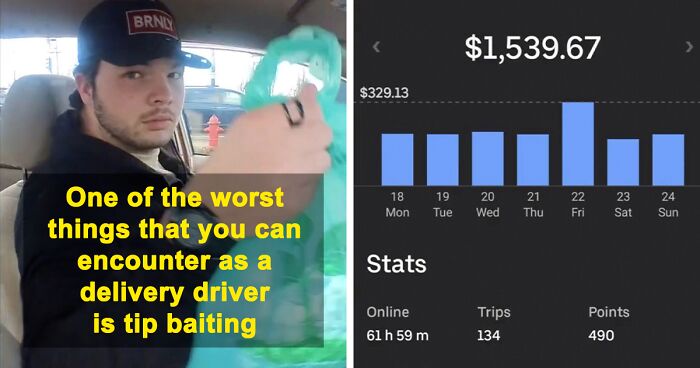
Customers Have Been Using Tips As Bait For Faster Service, And This DoorDash Guy Revealed How Bad It Really Is
Interview With AuthorThe act of tipping has changed significantly. In the bygone days, people tipped to acknowledge the quality of service they received. The waiter did an amazing job serving your whole family dinner? Well, here’s a $10 tip. Now, since technology-assisted apps, like Door Dash or Uber Eats, have taken over the world and changed the rules — people have started doubting the tipping culture altogether.
In his viral TikTok video that garnered over 4.8 million views, Portland-based Door Dash driver Owen Lindstrom explained and criticized a new phenomenon called ‘tip-baiting’: imagine being promised a generous tip for a quick delivery only for it to be taken away at the last minute. That doesn’t sound right.
Which is precisely why the video has been flooded with thousands of comments supporting Owen’s message — both from customers and delivery workers.
Every once in a while there comes an on-demand delivery person who will demonstrate just how broken the system is
To find out what inspired TikTok delivery driver to create this viral video, Bored Panda reached out to 22-year-old Owen, who was kind enough to answer all of our burning questions. He confirmed that he didn’t expect his video to go into the viral stratosphere. “I was running out of ideas at this point in my 100 days challenge and I just threw this idea out there only expecting it to get 10k – 15k views,” which is what Owen usually gets. His tip baiting story, on the other hand, garnered more views than his last 20 videos combined — including those with over 1 million views.
What Owen did expect, though, is that his video will get a two-way reaction. “I’ve been very active in my comments since I started and there have been people who are very supportive and appreciative of drivers. Just like there are plenty of people that have nothing good to say. So I expect that with every video,” he admitted. “What I didn’t expect was how extremely people felt about it. For the first time, I stopped reading my comments.”
And this Door Dash driver with over 90K followers did just that by revealing the scheming nature of ‘tip-baiting’
@owenlindstrom1 okay… I want your worst tip baiting stories. winner gets a crisp high five. #100daychallenge #fyp #deliverydriver #uberdriver #doordashdriver ♬ original sound – owenlindstrom
Talking about the problem that inspired him to pursue this idea for the TikTok, Owen admits that for the most part, customers are reasonable and generous enough not to exploit the system. “I’ve had tips lowered before but there have been reasons for those (restaurant going slow, bad traffic, missing items, etc.) and I don’t count that as tip baiting,” he told, agreeing with the notion that holding a tip over a driver’s head like a carrot on a stick does indeed inspire drivers to fully commit to their job.
“But people will take advantage of it, and that’s where the problems for the drivers begin,” Owen said. He hopes that his and other drivers’ stories will make the creators of multibillion-dollar apps finally take some action.
“All these food delivery apps are young and they are all spending billions to make it better for both the customer and the driver. As long as people are pushing for them to fix their problems (which people are doing), then over time, the balance of being fair both for the driver and the customer will slowly get better.”
The author then shares the breakdown of his salary to show just how important tips are
What a way to finish the 100 Day Challenge
@owenlindstrom1 100 days later… thank you to everyone for joining me on my 100 day journey #100daychallenge #fyp #deliverydriver #Doordash #ubereats ♬ original sound – owenlindstrom
Tipping has always been a tricky matter of business. There are guides that help service people increase their chances of getting an extra buck for their work. Same as there are tips that are lost in the confusing etiquette of tipping (20% of the pretax bill is the accepted norm, while dipping below 15% lets your waiter know that they did a so-so job).
To find out why some people would exploit the nature of tipping, Bored Panda reached out to Dr. Kevin Bennett, Ph.D. teaching professor of psychology at Penn State University and the author of ‘Jealousy’s Design: Maladaptive Trait or Psychological Solution?’.
Bennet thinks that the pandemic and limited face-to-face interaction between delivery drivers and customers might be a major reason why people tip bait. “We are more likely to tip more in situations involving meaningful face-to-face interactions, right? Without the social pressure that comes from real interactions, people feel more empowered to leave a lousy tip.” Or, perhaps, not to leave a tip at all (something that Owen rarely comes across, he admits).
People agreed that the main problem lies in the ways companies like Door Dash handle their business
After reading the reception Owen’s viral video received, it doesn’t come as a shock that around 60% of deliverers think tips (low or non-existent) are among the worst things about this profession, studies have shown.
Bennet explains this might also have to do with the underlying psychology of giving extra money to those who provide the goods and services. He says there’s compliance and acceptance: social psychologists describe the former as accepting something but not necessarily agreeing with it. Think of all times when you should have not drunk, but were persuaded by your convincing friends. Meanwhile, acceptance is when “you do something and you really buy into the purpose of your action,” Bennet explained. If you wash your hands because you truly believe in its effectiveness, not because someone convinced you it’s a good thing to do — that, dear Pandas, is acceptance.
Learning about Owen’s video and tip baiting, Bennet believes it’s not going away any time soon. “I think we are going to hear more about in the years to come. Tip baiting will result in better service in the long run — but only for those who’ll gain a reputation for dangling a big tip out there and then following through with that payment in the end.”
Hopefully, Uber Eats, Doordash and the rest of the major delivery services won’t make it a bigger problem than it currently is — at least for their hardworking drivers like Owen.
It reminds me of that Doordash driver who recorded a video telling customers to tip or else their food was gonna sit there forever. This is a consequence. And before you start ranting how *l* want people to work for me for free, l'm writing from Europe and l don't have a single delivery app on my phone.
Writing from Italy, i use deliveroo and just eat and to my knowledge they don't even have the option to tip.
Load More Replies...Sorry but this earning through tipping culture must go from America. Make your large companies accountable for paying their employees well. They should not be dependent on a variable for their living and the customer should not be held liable for providing business to the company and shelling extra to keep the employee happy. This is what is driving average working class American to poverty.
I see this type of comment a lot. Not tipping won't do anything to make the employer pay more. You are only punishing the server by not tipping. That's not a good excuse. Considering that the delivery person is using their own gas..which is so expensive these days, please tip them and servers!
Load More Replies...What madness is this? Who in their right mind tips BEFORE receiving the service they already paid for? Seems so totally alien and bizarre to me...
I do, it's the only way I can unless I'm planning on tipping cash. Our delivery apps require you to include your tip with your food payment so it's just easier to do everything at once. I always just assume I'll get decent service and so far I've been right.
Load More Replies...I know folks need to work, but 3rd party delivery apps are trash, plain and simple. Restaurants have to pay to use them, and so do you. Get out your phone, call your favorite restaurant (or use their actual website), order food, GO PICK IT UP. You will pay less, the restaurant will make more, any tip will go directly to the people who made the food you like (ZERO % of the tip you leave on the app goes to the restaurant). The local Taiwanese place w/BBT is $15 less for dinner for 2 carry out vs. delivery, that’s money in my pocket and theirs. Shop smart and support local businesses, not million dollar tech companies who treat drivers like disposable silverware…. That’s my rant, have great weekend!
But check the online web site. Most of them are run by 3rd party. The menu is smaller and prices are higher. Call the restaurant directly, ask if they use their own delivery people. 3rd party dd ue etc are making fat money on all YOUR work.
Load More Replies...Important but this is the response to drivers extorting big tips with threats of orders left to rot. U threatened ur companies customers what did u expect to happen.
You watched one viral video and think every driver does this. Dashers are considered self employed. The order is being declined because the pay is low. We have the option to accept or deny orders the system sends us.
Load More Replies...If you tip and take it back it says more about you than it does about the service
A person should get their meal in the same order as someone who tips or doesn't. The delivery people have created this problem by working a crap job and then not doing it if they can't rob people of money by not doing their job.
Load More Replies...Tipping cilturenis exploitation and should be illegal.feel free to tip in cash when you see the person, but incorporating living costs in to your salary is unreliable and wrong
But, it was the drivers who were all over the place bragging about how they left people's food sitting piled up at the restaurants who caused this. Overall, getting paid, receiving deliveries, and being able to eat and Enjoy the food you've ordered via the expensive apps shouldn't be based on whether you've put $3 or $5 as a tip. Just pay people already.
This is what people don't seem to understand about these delivery services. As a delivery driver, my only responsibility is to pick up the food from the restaurant and drop that food off in the same state that I received it in. If the food is cold or late quite honestly it's not my problem that needs to be taken up with the delivery service in the restaurant. I have set costs involved in time and mileage and I will deliver the food that I pick up. So for someone to tip bait me is effectively being a thief. The rating systems need to also be drastically altered. As I stated before, there's something wrong with your food after I drop it off I eat something missing it took significantly longer to get to you than it should have, and or it's cold, it is not my fault don't poorly rate my delivery because of something that is out of my control.
Nope they arent a thief, Is it only America that does this? Because I tip the lowest amount and didnt even know I could put in my own numbers. I Always get it quick and never have some whiny bitch complaining. The drivers in Canada do their job and they do it right.
Load More Replies...Some people are truly disgusting. Tip baiting. WTF?! God I hate people sometimes....
But u don't hate the drivers who extort bigger tips with threats of left food?
Load More Replies...Not to be That b!tch, and both sides have been wrong in this 'discussion', but maybe don't act like customers HAVE to tip you large just to get what we've already paid for. Tips are a thank you for a great service- already experienced by the customer. I'm sure plenty have already said in the comments about how tipping needs to just disappear all together here in the usa. Also? Get y'alls butts together and discuss with these companies to pay you a living wage, and not depend on tips to live. Those should be literally just bonuses, not making negative life differences.
Reading about these things comes pretty much as a culture shock to me. Here in Korea, we just have a preset fee we pay for the service and nobody argues. That fee is also not decided by the customer, it's just the price we see and we can only choose to make that order or not. So simple.
Thanks, now I know how to get my food faster without having to pay extra. This "how-to" was very helpful.
Sorry but in my area, the drivers are the problem. There are a lot of restaurants around my house, plus I'm near two universities. Drivers will accept my order but not move until they have three or four orders stacked up and then go pick up the foods and deliver them in whatever order works best for them. I watch as the driver goes from being 4 minutes away to 19 minutes away then back to 8 minutes before they start heading towards my place. It is absolutely infuriating. Don't ask me to pay more than the service fee, tax, delivery fee and another tip on top of all that??? No. If I get my food delivered in a reasonable amount of time and the driver doesn't leave it sitting outside in the steps in the Canadian winter - then I might give an extra tip. Hasn't happened yet though.
I usually start with median tip and either leave it, increase or decrease based on how late Ng it takes my order to arrive to me based on the time I know it should, the appearance of packaging when it gets to me, and the drivers attitude. I never look to or want to decrease or remove a tip all together. I would honestly prefer to tip all together after or in cash but quickly learned if you did so you were lucky to get your order. I do believe drivers did alot of it to themselves by making a big deal of showing low and no tip orders would just sit there. Some people ordering are also probably people working who don't make a ton of money as well and can't leave work and these services provide a way they can have lunch delivered but can't afford a huge tip but try to tip what they can
"While it's good to protect the customer from bad service by holding the tip over your head" = "If I want my slave to work harder I show them my whip."
Drivers shouldn't have opened panDora's box with threats of orders left to rot if they didn't tip big. Extortion is illegal in America remember.
Load More Replies...Seriously. These people work for a company. Your wages come from that company. Tips are the bonus for their effort. I have a problem tipping before receiving food. I tend to go the cash route. Last time I used Doordash the deli ery driver called saying they couldn't find my apartment. I headed downstairs to find them waiting. The person was just obese and didn't want to walk up a flight (singular) of stairs.
Since when do people tip prior to service? I don't use DoorDash or any of those, but I have used Uber on occasion. I left a negative rating for one driver & I guess mine was the last straw, because she got fired and sent me a really nasty text message. I texted her back & told her that maybe if she hadn't been looking at her phone she would have noticed the TWO stop signs she blew through. We could have been seriously injured or worse. F*ck you, b*tch. Glad I didn't "tip" her beforehand.
"i want my food in insulated bags" = i want more plastic trash for free while we are already suffocating in plastic 💀
My MIL has been doing DD for about a year and told me she doesn't see her tip until after delivery. So how would one 'tip bait'
I didn't know I could increase it afterward. How do I do that? I always do the top tip they calculate for them, but when you can tell someone just really did a good job I'd love to add on. How do I do that?
Do faster service because its your F*****G JOB DINGUS. Thats it, thats all. I tip the least amount on the app and always get fast service and give them positive reviews. When I order food at work Im always waiting for them at the door so they barely get out of their car and they move on to the next delivery. I ran a moving delivery company for years and I made money by the delivery. Get your work done not drag it out because you are making your own day longer and essentially making less money. 5 deliveries in an hour which do you want to be paid for? The 5 or the one hour?
I work with impoverished and mentally I'll patients. Door dash, Instacart, and the like have been a godsend for them specifically because they are not treated like regular employees. They can work when they feel up to it and don't have to when they are not well. There is no explaining to a boss that they can't get out of bed. I have more patients now with a little extra cash than I've ever had. Forcing these companies to "employ" them would take away all that freedom. Independent contracting is amazing for these folks. How about instead of taking away people's livelihoods you actually just pay people nice tips? And extra few dollars from everyone for something that is a luxury- after all you don't NEED door dash- and you make someone else's life better. Try that.
This is why I don't use delivery services. Do the drivers think people will feel sorry for them and tip more? It is just another reason to plan ahead and grab your own take out, or just have food from the grocery store. A lot of people are not doing well, and forcing someone to pay a tip to receive a service that doesn't require a tip is ridiculous. These gig workers do this job because it requires almost zero skill or brains. They aren't able to, or want to get, a real job.
The easiest fix is raising delivery fees slightly and then adding a review option for customers and not penalizing drivers for refusing orders from people with bad reputations. It is really that simple.
Great solution. Workers will see less and less orders because they can't do their job properly without being paid more than the service is worth. Workers can play these games all they want, but in the end they will hurt themselves because food delivery drivers are the most unessential workers out there and are a completely expendable industry.
Load More Replies...So for some who don't understand from a Dasher perspective. Have a pic on my phone right now of an order I declined to pick up recently (which means it offers to other drivers and they may decline too, hence the slow delivery). It was $3.25 to drive 7 miles. What some may not realize is I will likely have to drive around those 7 miles back to get to a restaurant again to get my next order. So, that's almost half a gallon of gas in my Corolla so that order costs me about $1.50 at current prices to do the delivery. Given wait time, traffic, and drive time, 30 minutes could pass before I'm able to grab another order. I just worked for $1.75 for 30 minutes. It likely had no tip at that pay and 99% of orders don't tip if they don't in the app. That is why that order is declined which simply means it goes around until a driver finally accepts it. Sometimes I've been dumb enough to do it.
I give my tips in cash, to the delivery guy... How low can people get?
I'm not sure if this is true but I was told that tips came from "To Insure Prompt Service" and it was paid prior to the meal. Like I said, I do t know if it's true. Hoping a fellow Panda knows
Recently drove 15 mins to grab food and drive 15 miles to drop off. We are in ruel NY. GOT $1.00. DIDNT EVEN PAY FOR MY GAS AND UBER PAID ME A WHOPPING $2.50 SCUMBAGS
If you didn't have to give a high tip to make up for the appalling lack of wage, in order for your food not to turn up an hour late and cold, then tip baiting wouldn't happen. I don't use these services, because the one time I tried it my order was missing food and cost so much more than me getting up and going to get it myself
People already tip nothing like at least half the time on doordash so I would almost prefer this because then I at least have a chance to get something
You know your order is coming so if your not at home and ordering food at work than you Wait at the entrance for the driver. They Dont need big tips as they are getting paid well enough to deliver. It works by say doing 5 deliveries in an hour, you get paid by deliver not the hour. Getting their order dropped off and back on the road is what they need. Idiot drivers who dont take the orders get in trouble as the customer complains to the restaurant and the restaurant deals with the driver. Wasting their food, the customer can get the order for free
5 deliveries an hour? In my dreams, because that isn't real.
Load More Replies...After reading an article about how doordash employees talked about how they priortize your delivery based on the size of the tip i find it hard to Sympathize. Basically if you tip well then you get ur food first but if you don't tip then your food will be left alone even if has been ready for hours.
I tip generously every time. If it suggests $6.46 I'll round up to $10. But I've never dropped a tip down. I will mark bad service tho. Don't leave food inside porch but out in the driveway. Bad mark. (My drop off point is stated inside porch under mailbox, please don't block door from opening.) leave it on the stoop so I can't open my door without knocking it over? Inside against another door I can't open so I have to go out the back door an walk around the house to clear a door? On the trunk of my car? I just send a message by marking the service accordingly an I know they get that message. Sometimes if my food is destroyed in the bag but it took the tip already, I'll have to contact the restaurant an send photos in the app (ubereats) and try to recover that way. Everyone needs to make a living. It's tip in app or leave the tip off and a message that you tip cash on delievery.
This is the “gig economy”, that corporatists kept telling people was best for everyone... Laissez-faire capitalism is destroying human civilization and the people benefitting from it are a tiny minority, laughing all the way to their cushy and luxurious old age while the rest of us are effectively enslaved to them, working ourselves to early aging, breakdown, and disability (if we’re lucky enough to get that).
F**k that! they do the job on purpose and most are useless. I only tip the least amount and I always get my order on time. There are idiot drivers who Only take orders that have a higher tip and my Fiance has had to fire them for costing the restaurant money when the customer Doesnt get their food and complains.
You can't change the tip once the order has been placed with Doordash. They don't let you.
Yes they do. I did it just a few months ago. I accidentally sent my delivery driver to the wrong address and he offered to take the food to my kids at the correct address. I ended up changing my $5 tip to $9 and then msging DoorDash to add another $6 onto it because that guy was amazing!
Load More Replies...You can't change a tip once the order has been placed on Doordash. They don't let you.
It reminds me of that Doordash driver who recorded a video telling customers to tip or else their food was gonna sit there forever. This is a consequence. And before you start ranting how *l* want people to work for me for free, l'm writing from Europe and l don't have a single delivery app on my phone.
Writing from Italy, i use deliveroo and just eat and to my knowledge they don't even have the option to tip.
Load More Replies...Sorry but this earning through tipping culture must go from America. Make your large companies accountable for paying their employees well. They should not be dependent on a variable for their living and the customer should not be held liable for providing business to the company and shelling extra to keep the employee happy. This is what is driving average working class American to poverty.
I see this type of comment a lot. Not tipping won't do anything to make the employer pay more. You are only punishing the server by not tipping. That's not a good excuse. Considering that the delivery person is using their own gas..which is so expensive these days, please tip them and servers!
Load More Replies...What madness is this? Who in their right mind tips BEFORE receiving the service they already paid for? Seems so totally alien and bizarre to me...
I do, it's the only way I can unless I'm planning on tipping cash. Our delivery apps require you to include your tip with your food payment so it's just easier to do everything at once. I always just assume I'll get decent service and so far I've been right.
Load More Replies...I know folks need to work, but 3rd party delivery apps are trash, plain and simple. Restaurants have to pay to use them, and so do you. Get out your phone, call your favorite restaurant (or use their actual website), order food, GO PICK IT UP. You will pay less, the restaurant will make more, any tip will go directly to the people who made the food you like (ZERO % of the tip you leave on the app goes to the restaurant). The local Taiwanese place w/BBT is $15 less for dinner for 2 carry out vs. delivery, that’s money in my pocket and theirs. Shop smart and support local businesses, not million dollar tech companies who treat drivers like disposable silverware…. That’s my rant, have great weekend!
But check the online web site. Most of them are run by 3rd party. The menu is smaller and prices are higher. Call the restaurant directly, ask if they use their own delivery people. 3rd party dd ue etc are making fat money on all YOUR work.
Load More Replies...Important but this is the response to drivers extorting big tips with threats of orders left to rot. U threatened ur companies customers what did u expect to happen.
You watched one viral video and think every driver does this. Dashers are considered self employed. The order is being declined because the pay is low. We have the option to accept or deny orders the system sends us.
Load More Replies...If you tip and take it back it says more about you than it does about the service
A person should get their meal in the same order as someone who tips or doesn't. The delivery people have created this problem by working a crap job and then not doing it if they can't rob people of money by not doing their job.
Load More Replies...Tipping cilturenis exploitation and should be illegal.feel free to tip in cash when you see the person, but incorporating living costs in to your salary is unreliable and wrong
But, it was the drivers who were all over the place bragging about how they left people's food sitting piled up at the restaurants who caused this. Overall, getting paid, receiving deliveries, and being able to eat and Enjoy the food you've ordered via the expensive apps shouldn't be based on whether you've put $3 or $5 as a tip. Just pay people already.
This is what people don't seem to understand about these delivery services. As a delivery driver, my only responsibility is to pick up the food from the restaurant and drop that food off in the same state that I received it in. If the food is cold or late quite honestly it's not my problem that needs to be taken up with the delivery service in the restaurant. I have set costs involved in time and mileage and I will deliver the food that I pick up. So for someone to tip bait me is effectively being a thief. The rating systems need to also be drastically altered. As I stated before, there's something wrong with your food after I drop it off I eat something missing it took significantly longer to get to you than it should have, and or it's cold, it is not my fault don't poorly rate my delivery because of something that is out of my control.
Nope they arent a thief, Is it only America that does this? Because I tip the lowest amount and didnt even know I could put in my own numbers. I Always get it quick and never have some whiny bitch complaining. The drivers in Canada do their job and they do it right.
Load More Replies...Some people are truly disgusting. Tip baiting. WTF?! God I hate people sometimes....
But u don't hate the drivers who extort bigger tips with threats of left food?
Load More Replies...Not to be That b!tch, and both sides have been wrong in this 'discussion', but maybe don't act like customers HAVE to tip you large just to get what we've already paid for. Tips are a thank you for a great service- already experienced by the customer. I'm sure plenty have already said in the comments about how tipping needs to just disappear all together here in the usa. Also? Get y'alls butts together and discuss with these companies to pay you a living wage, and not depend on tips to live. Those should be literally just bonuses, not making negative life differences.
Reading about these things comes pretty much as a culture shock to me. Here in Korea, we just have a preset fee we pay for the service and nobody argues. That fee is also not decided by the customer, it's just the price we see and we can only choose to make that order or not. So simple.
Thanks, now I know how to get my food faster without having to pay extra. This "how-to" was very helpful.
Sorry but in my area, the drivers are the problem. There are a lot of restaurants around my house, plus I'm near two universities. Drivers will accept my order but not move until they have three or four orders stacked up and then go pick up the foods and deliver them in whatever order works best for them. I watch as the driver goes from being 4 minutes away to 19 minutes away then back to 8 minutes before they start heading towards my place. It is absolutely infuriating. Don't ask me to pay more than the service fee, tax, delivery fee and another tip on top of all that??? No. If I get my food delivered in a reasonable amount of time and the driver doesn't leave it sitting outside in the steps in the Canadian winter - then I might give an extra tip. Hasn't happened yet though.
I usually start with median tip and either leave it, increase or decrease based on how late Ng it takes my order to arrive to me based on the time I know it should, the appearance of packaging when it gets to me, and the drivers attitude. I never look to or want to decrease or remove a tip all together. I would honestly prefer to tip all together after or in cash but quickly learned if you did so you were lucky to get your order. I do believe drivers did alot of it to themselves by making a big deal of showing low and no tip orders would just sit there. Some people ordering are also probably people working who don't make a ton of money as well and can't leave work and these services provide a way they can have lunch delivered but can't afford a huge tip but try to tip what they can
"While it's good to protect the customer from bad service by holding the tip over your head" = "If I want my slave to work harder I show them my whip."
Drivers shouldn't have opened panDora's box with threats of orders left to rot if they didn't tip big. Extortion is illegal in America remember.
Load More Replies...Seriously. These people work for a company. Your wages come from that company. Tips are the bonus for their effort. I have a problem tipping before receiving food. I tend to go the cash route. Last time I used Doordash the deli ery driver called saying they couldn't find my apartment. I headed downstairs to find them waiting. The person was just obese and didn't want to walk up a flight (singular) of stairs.
Since when do people tip prior to service? I don't use DoorDash or any of those, but I have used Uber on occasion. I left a negative rating for one driver & I guess mine was the last straw, because she got fired and sent me a really nasty text message. I texted her back & told her that maybe if she hadn't been looking at her phone she would have noticed the TWO stop signs she blew through. We could have been seriously injured or worse. F*ck you, b*tch. Glad I didn't "tip" her beforehand.
"i want my food in insulated bags" = i want more plastic trash for free while we are already suffocating in plastic 💀
My MIL has been doing DD for about a year and told me she doesn't see her tip until after delivery. So how would one 'tip bait'
I didn't know I could increase it afterward. How do I do that? I always do the top tip they calculate for them, but when you can tell someone just really did a good job I'd love to add on. How do I do that?
Do faster service because its your F*****G JOB DINGUS. Thats it, thats all. I tip the least amount on the app and always get fast service and give them positive reviews. When I order food at work Im always waiting for them at the door so they barely get out of their car and they move on to the next delivery. I ran a moving delivery company for years and I made money by the delivery. Get your work done not drag it out because you are making your own day longer and essentially making less money. 5 deliveries in an hour which do you want to be paid for? The 5 or the one hour?
I work with impoverished and mentally I'll patients. Door dash, Instacart, and the like have been a godsend for them specifically because they are not treated like regular employees. They can work when they feel up to it and don't have to when they are not well. There is no explaining to a boss that they can't get out of bed. I have more patients now with a little extra cash than I've ever had. Forcing these companies to "employ" them would take away all that freedom. Independent contracting is amazing for these folks. How about instead of taking away people's livelihoods you actually just pay people nice tips? And extra few dollars from everyone for something that is a luxury- after all you don't NEED door dash- and you make someone else's life better. Try that.
This is why I don't use delivery services. Do the drivers think people will feel sorry for them and tip more? It is just another reason to plan ahead and grab your own take out, or just have food from the grocery store. A lot of people are not doing well, and forcing someone to pay a tip to receive a service that doesn't require a tip is ridiculous. These gig workers do this job because it requires almost zero skill or brains. They aren't able to, or want to get, a real job.
The easiest fix is raising delivery fees slightly and then adding a review option for customers and not penalizing drivers for refusing orders from people with bad reputations. It is really that simple.
Great solution. Workers will see less and less orders because they can't do their job properly without being paid more than the service is worth. Workers can play these games all they want, but in the end they will hurt themselves because food delivery drivers are the most unessential workers out there and are a completely expendable industry.
Load More Replies...So for some who don't understand from a Dasher perspective. Have a pic on my phone right now of an order I declined to pick up recently (which means it offers to other drivers and they may decline too, hence the slow delivery). It was $3.25 to drive 7 miles. What some may not realize is I will likely have to drive around those 7 miles back to get to a restaurant again to get my next order. So, that's almost half a gallon of gas in my Corolla so that order costs me about $1.50 at current prices to do the delivery. Given wait time, traffic, and drive time, 30 minutes could pass before I'm able to grab another order. I just worked for $1.75 for 30 minutes. It likely had no tip at that pay and 99% of orders don't tip if they don't in the app. That is why that order is declined which simply means it goes around until a driver finally accepts it. Sometimes I've been dumb enough to do it.
I give my tips in cash, to the delivery guy... How low can people get?
I'm not sure if this is true but I was told that tips came from "To Insure Prompt Service" and it was paid prior to the meal. Like I said, I do t know if it's true. Hoping a fellow Panda knows
Recently drove 15 mins to grab food and drive 15 miles to drop off. We are in ruel NY. GOT $1.00. DIDNT EVEN PAY FOR MY GAS AND UBER PAID ME A WHOPPING $2.50 SCUMBAGS
If you didn't have to give a high tip to make up for the appalling lack of wage, in order for your food not to turn up an hour late and cold, then tip baiting wouldn't happen. I don't use these services, because the one time I tried it my order was missing food and cost so much more than me getting up and going to get it myself
People already tip nothing like at least half the time on doordash so I would almost prefer this because then I at least have a chance to get something
You know your order is coming so if your not at home and ordering food at work than you Wait at the entrance for the driver. They Dont need big tips as they are getting paid well enough to deliver. It works by say doing 5 deliveries in an hour, you get paid by deliver not the hour. Getting their order dropped off and back on the road is what they need. Idiot drivers who dont take the orders get in trouble as the customer complains to the restaurant and the restaurant deals with the driver. Wasting their food, the customer can get the order for free
5 deliveries an hour? In my dreams, because that isn't real.
Load More Replies...After reading an article about how doordash employees talked about how they priortize your delivery based on the size of the tip i find it hard to Sympathize. Basically if you tip well then you get ur food first but if you don't tip then your food will be left alone even if has been ready for hours.
I tip generously every time. If it suggests $6.46 I'll round up to $10. But I've never dropped a tip down. I will mark bad service tho. Don't leave food inside porch but out in the driveway. Bad mark. (My drop off point is stated inside porch under mailbox, please don't block door from opening.) leave it on the stoop so I can't open my door without knocking it over? Inside against another door I can't open so I have to go out the back door an walk around the house to clear a door? On the trunk of my car? I just send a message by marking the service accordingly an I know they get that message. Sometimes if my food is destroyed in the bag but it took the tip already, I'll have to contact the restaurant an send photos in the app (ubereats) and try to recover that way. Everyone needs to make a living. It's tip in app or leave the tip off and a message that you tip cash on delievery.
This is the “gig economy”, that corporatists kept telling people was best for everyone... Laissez-faire capitalism is destroying human civilization and the people benefitting from it are a tiny minority, laughing all the way to their cushy and luxurious old age while the rest of us are effectively enslaved to them, working ourselves to early aging, breakdown, and disability (if we’re lucky enough to get that).
F**k that! they do the job on purpose and most are useless. I only tip the least amount and I always get my order on time. There are idiot drivers who Only take orders that have a higher tip and my Fiance has had to fire them for costing the restaurant money when the customer Doesnt get their food and complains.
You can't change the tip once the order has been placed with Doordash. They don't let you.
Yes they do. I did it just a few months ago. I accidentally sent my delivery driver to the wrong address and he offered to take the food to my kids at the correct address. I ended up changing my $5 tip to $9 and then msging DoorDash to add another $6 onto it because that guy was amazing!
Load More Replies...You can't change a tip once the order has been placed on Doordash. They don't let you.
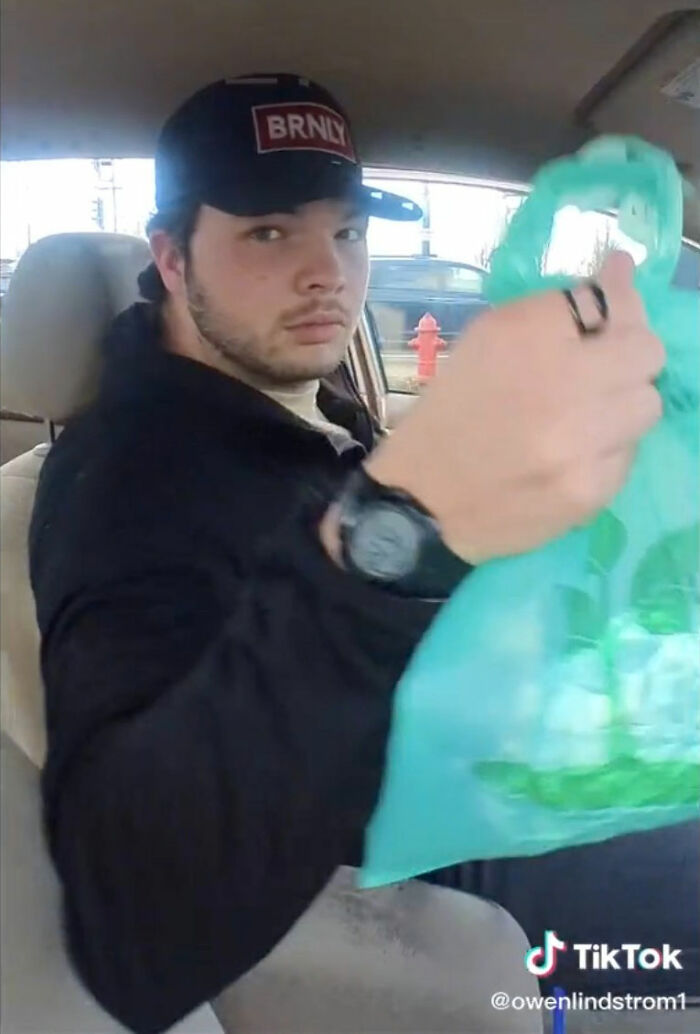
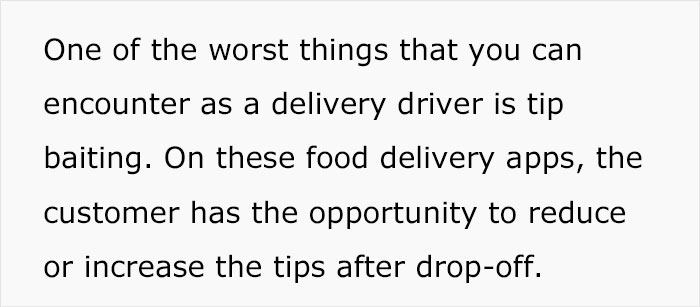
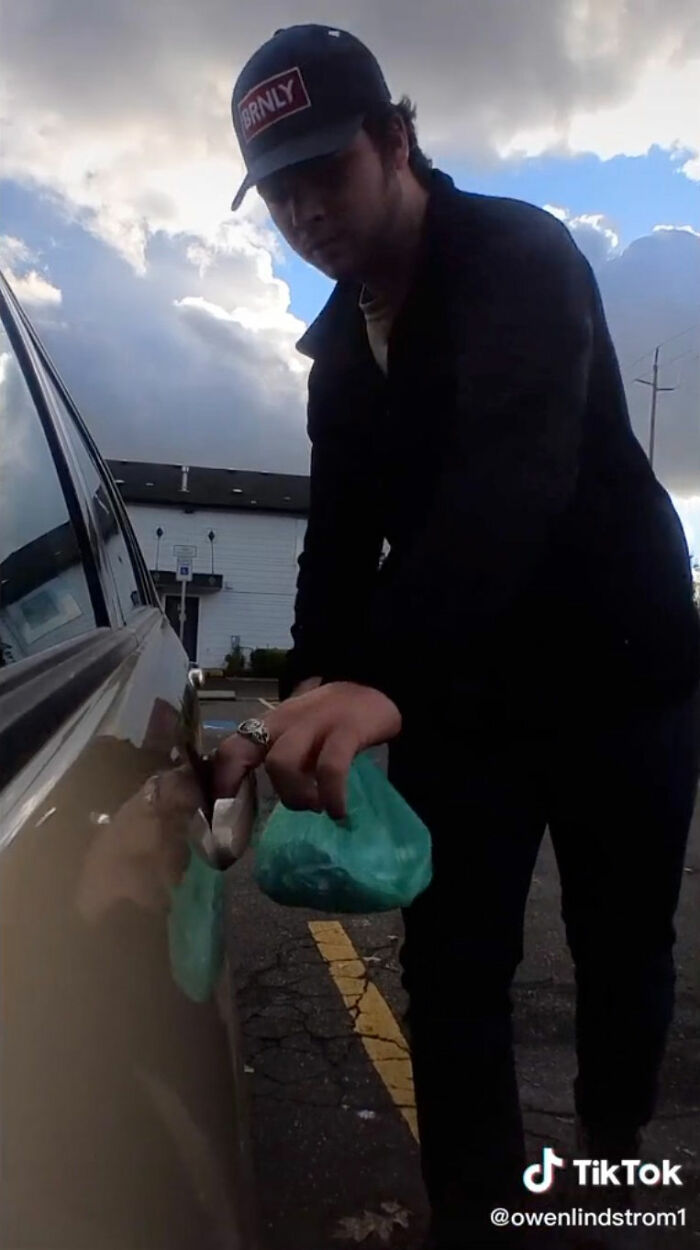
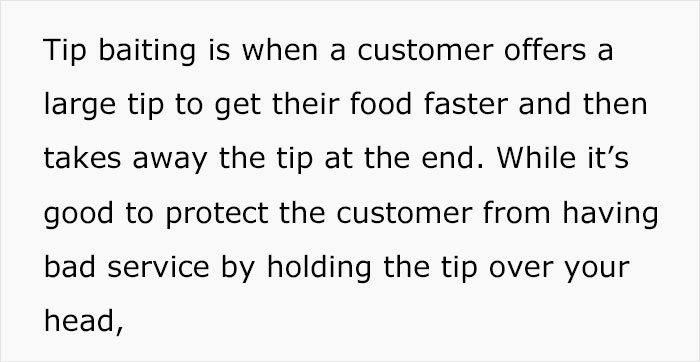
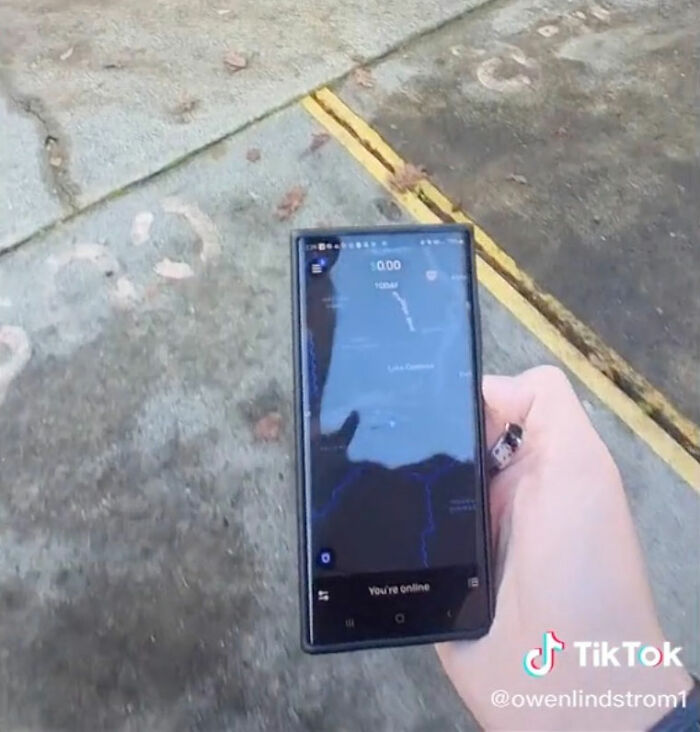
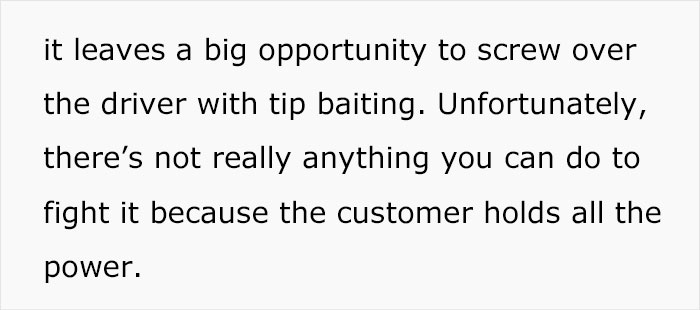
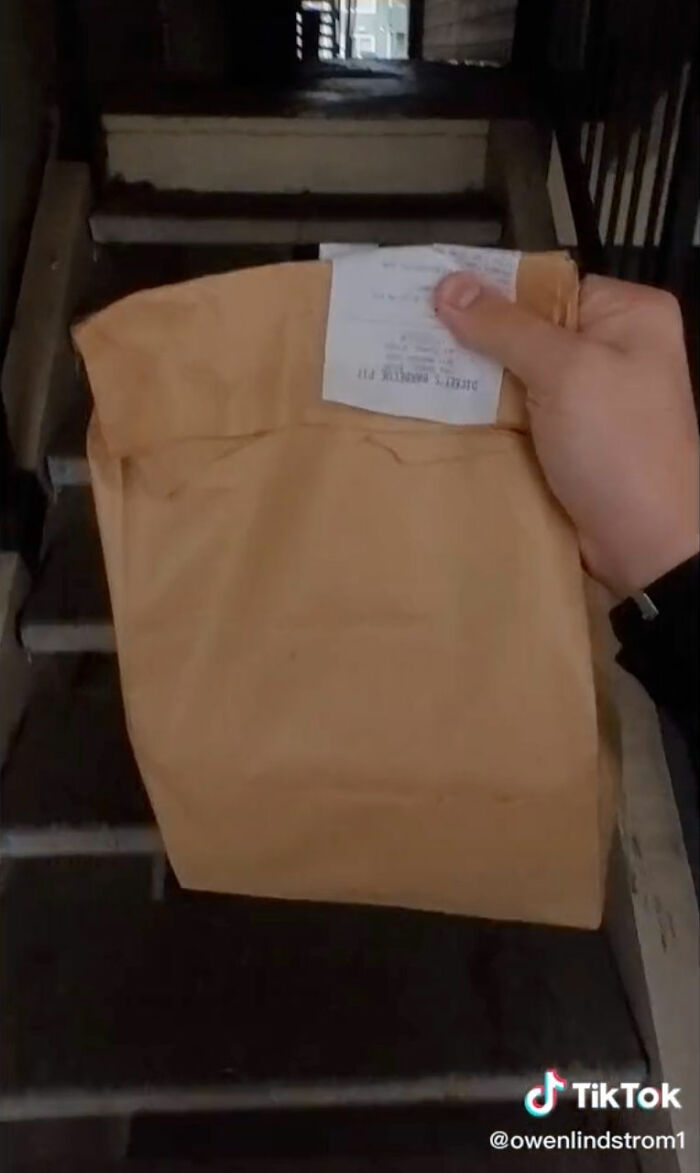
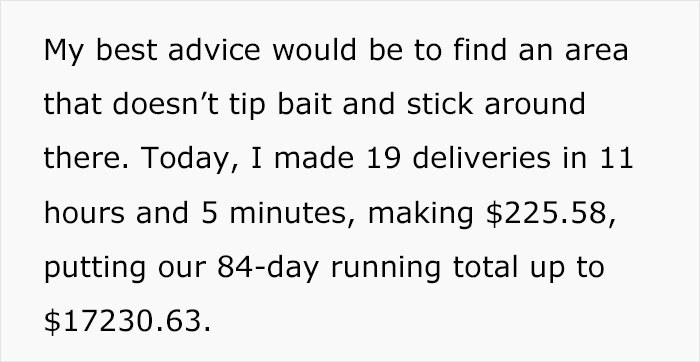
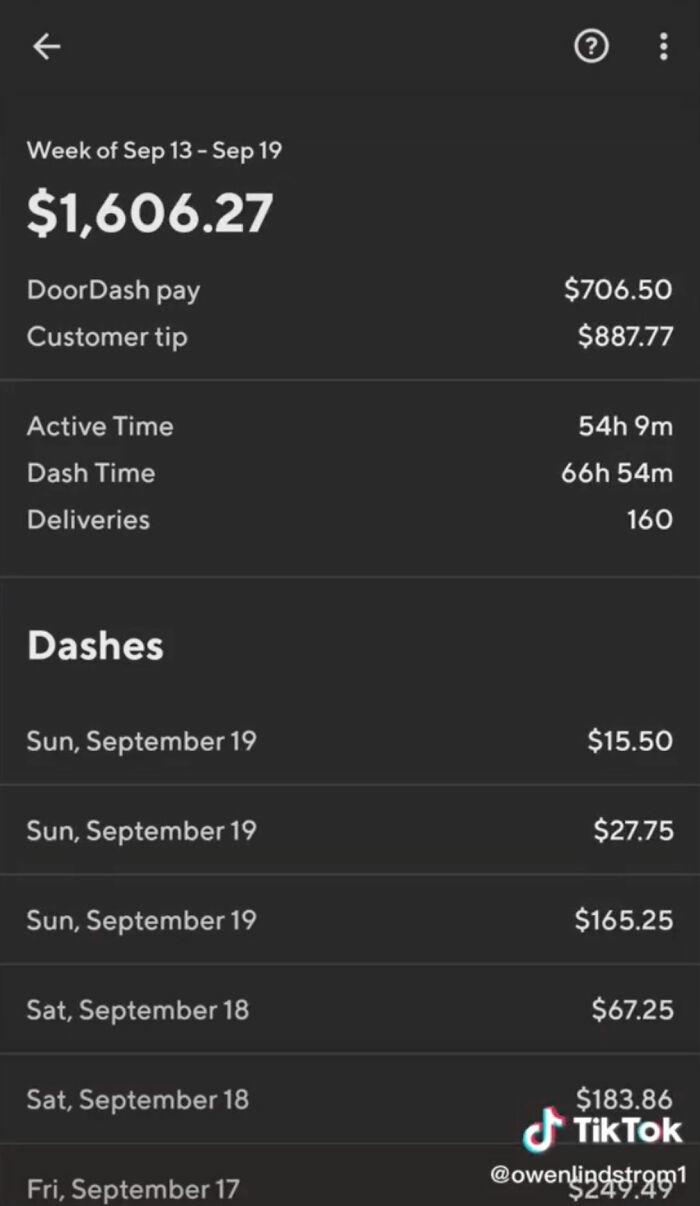
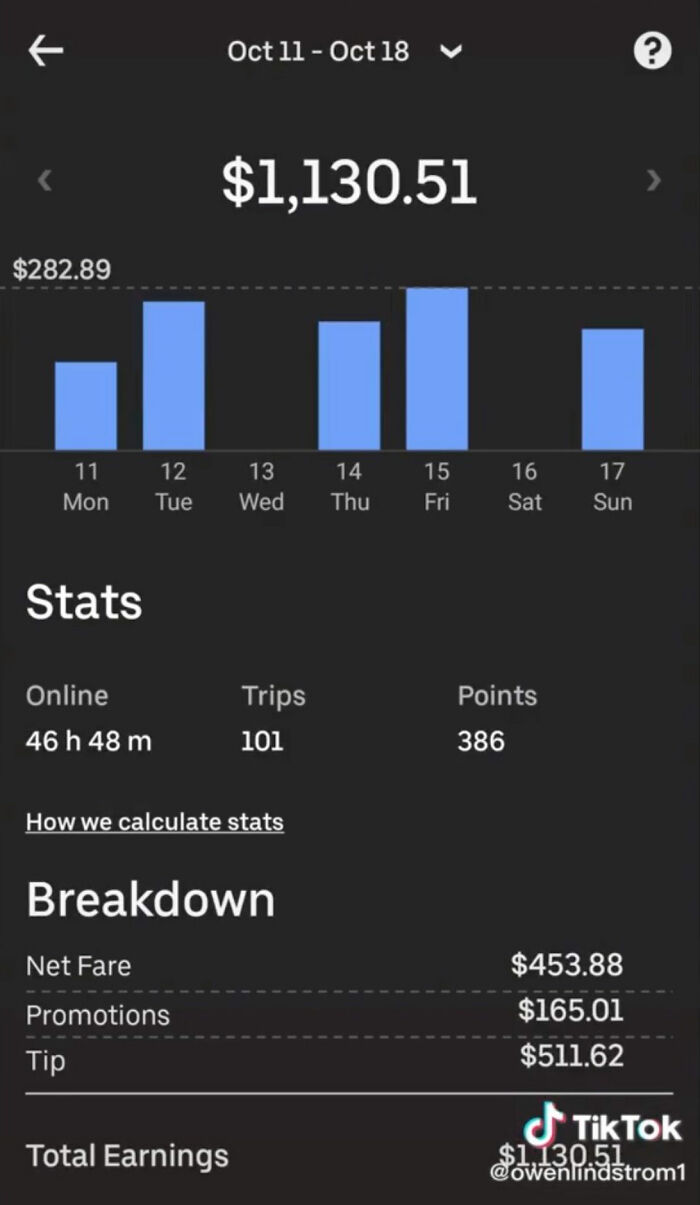
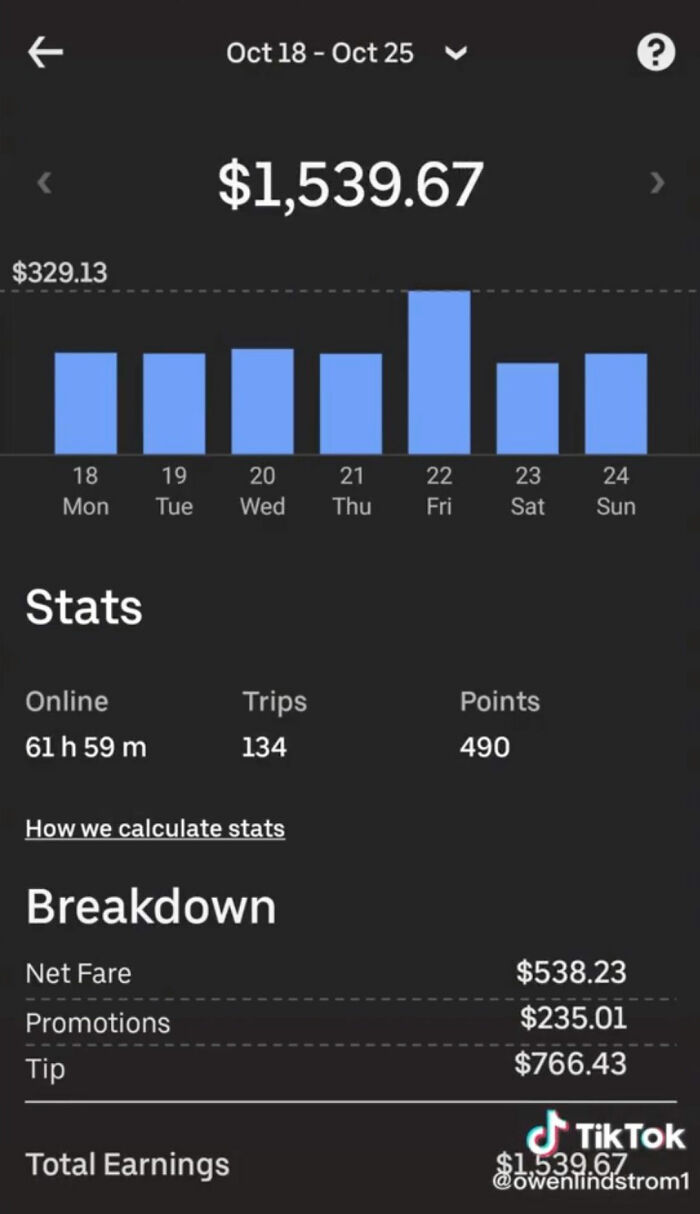
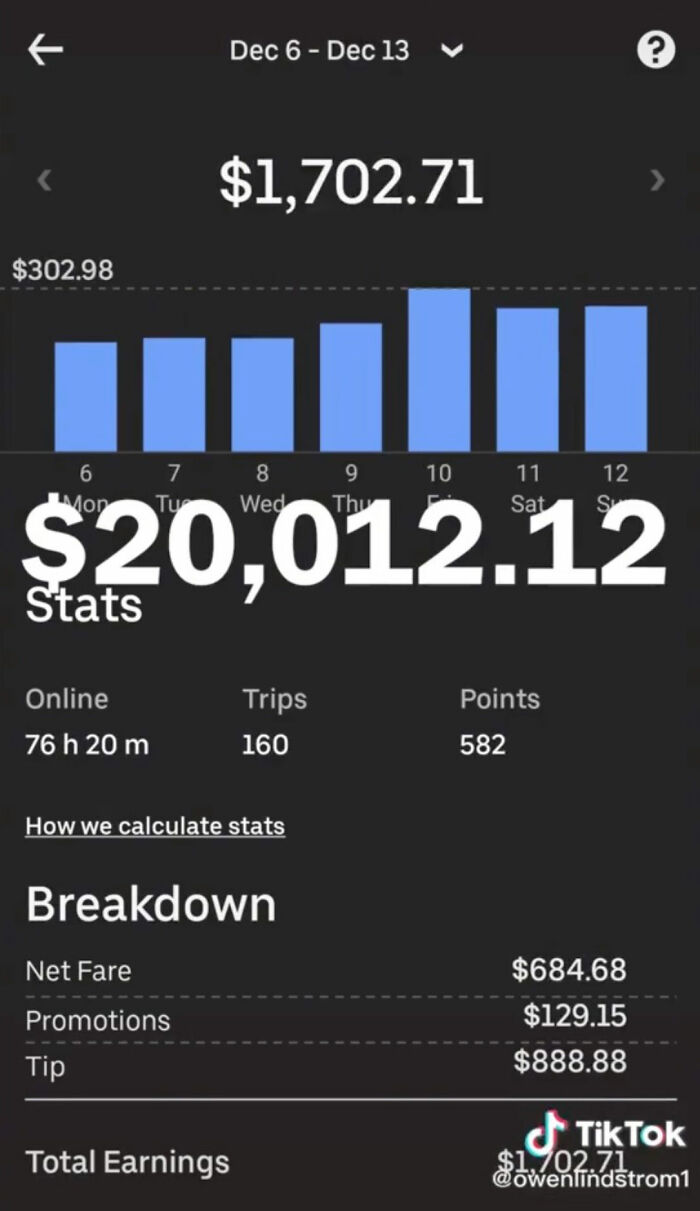
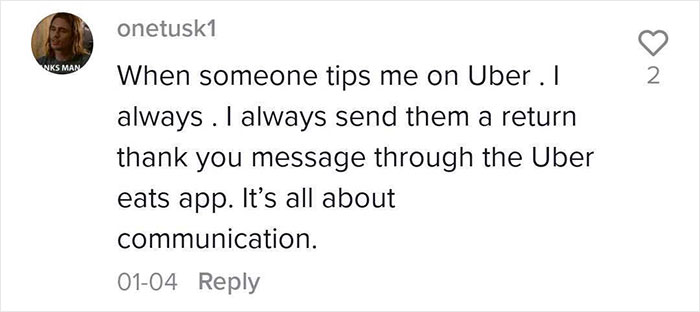

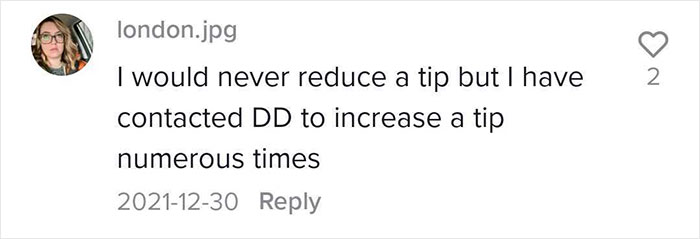
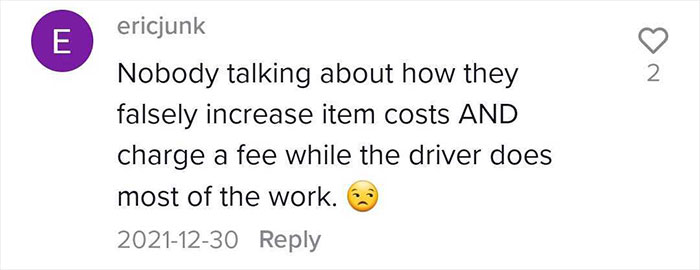
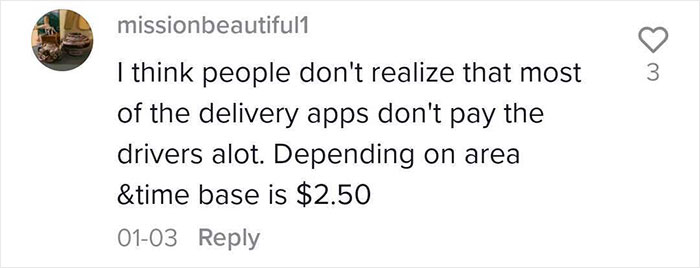
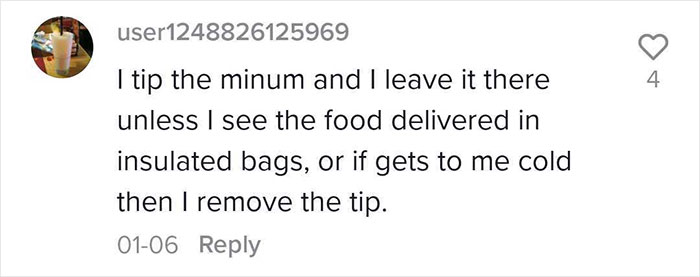
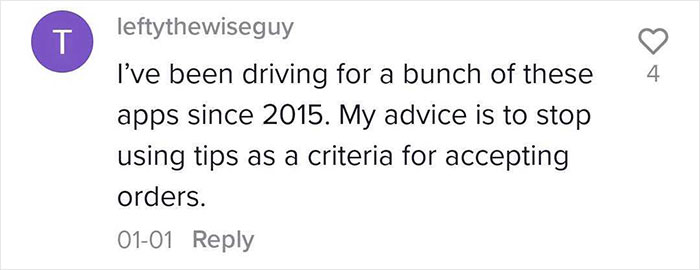




79
113